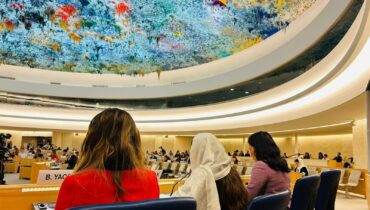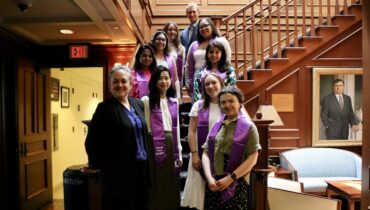On February 1, 2021, the military seized power in Burma. Now, Burma faces a dire human rights and humanitarian crisis, with atrocities escalating by the day under the military junta.
In recognition of the two-year anniversary of the coup, the Georgetown Institute for Women, Peace and Security coordinated a list of recommendations, drawn from consultations with Burmese women leaders and experts.
Background
Over the past two years, security forces have intensified their brutality, committing arbitrary detentions, torture, and killings that amount to crimes against humanity and war crimes. The military has arrested over 17,000 civilians and killed thousands of others through crackdowns on pro-democracy movements. Nearly 15 million people are in need of humanitarian assistance, 1.5 million people have been displaced, and almost half of the population lives below the poverty line. International assistance, justice, and accountability measures are urgently needed.
Abuses are particularly severe for Burmese women, girls, and minorities who face widespread sexual and gender-based violence, as well as rampant human trafficking. The military has targeted women human rights defenders (WHRDs), protesters, and politicians, with the number of attacks extremely underreported. An estimated 3,100 women activists have been detained, and nine WHRDs are on death row. The escalation of violence has exacerbated the worsening humanitarian crisis, particularly for women, girls, and ethnic and religious minority communities, including the Rohingya people.
Despite these challenges, women have emerged as leaders and symbols of the pro-democracy resistance movement, spearheading mass demonstrations and civil disobedience efforts across the country. They are documenting atrocities, delivering humanitarian assistance, and rising up to defend human rights, often at great risk to themselves. Attention to the implementation of UN Security Council Resolution (UNSCR) 1325 in Burma, which affirms the importance of women’s full and equal participation in peace and security, is critical to sustain their efforts and secure a more peaceful, prosperous, and democratic future.
Here are key recommendations from Burmese civil society leaders:
1. UTILIZE INTERNATIONAL SOURCES OF LEVERAGE
- The United States should work with allies to expand mandatory sanctions on Burma’s oil and gas industry, including on Myanmar Oil and Gas Enterprise (MOGE), which accounts for much of the junta’s financial assets. Building on the U.S. BURMA Act, global sanctions should target financial flows, military businesses, and assets connected to human rights violators. Conflict-related sexual violence (CRSV) should be a stand-alone criterion for designation.
- The United States and the United Kingdom should lead the call for a global arms embargo at the UN Security Council, with robust monitoring and enforcement mechanisms, to cut off the supply of weapons to the military.
- Global actors should utilize all international fora to publicly condemn the military for violating international law, including by recognizing the genocide against the Rohingya people.
- UN Member States should deny legitimacy to the military junta by refusing to be photographed with leaders, coordinate with them, or recognize the sham elections in 2023. Instead, they should recognize and support the National Unity Government (NUG) and its related entities as the legitimate authority.
2. ENGAGE REGIONAL AND INTERNATIONAL STAKEHOLDERS
- GIWPS welcomes the joint statement by the U.S. and international partners to commit to supporting the pro-democracy movement and its efforts to foster a more peaceful, inclusive, and prosperous Burma. Policymakers should ensure the situation in Burma is a priority at upcoming international fora, including the U.S. Summit for Democracy and the G7 Hiroshima Summit.
- ASEAN Foreign Ministers should extensively consult Burmese women and civil society to develop the implementation plan for the Five Point Consensus. Indonesia’s new Special Envoy to coordinate ASEAN’s handling of the conflict in Myanmar can play a leading role.
- ASEAN leaders should continue to ban the junta from participation at the annual Summit and in working-level ASEAN Sectoral Bodies and Commissions.
- Foreign government officials should increase public and private engagement with the NUG, women democracy activists, and other key actors resisting the junta. Women and minority groups should be meaningfully included in all political consultations at national and global levels.
3. ADVANCE JUSTICE AND ACCOUNTABILITY
- The international community should pursue a UN Security Council resolution to refer the situation in Myanmar to the International Criminal Court (ICC). In parallel, states should support other international justice efforts for accountability in Myanmar currently underway, including The Gambia’s case at the International Court of Justice (ICJ) and Argentina’s prosecution via universal jurisdiction.
- The CEDAW Committee should request an exceptional report on the situation of women and girls in Myanmar and ensure independent investigations hold perpetrators accountable for systematic sexual violence against the Rohingya people and other marginalized groups.
- The UN should use the Security Council’s Chapter VII authority to address systematic gross human rights violations that amount to war crimes and crimes against humanity.
- UN Member States should continue to take strong, coordinated actions to secure the release of Burmese political activists and seek accountability for the four prisoners unlawfully executed.
4. PROVIDE INCLUSIVE HUMANITARIAN AID DELIVERY AND DISTRIBUTION
- The United States and ASEAN should work with Thailand and India to facilitate cross-border humanitarian assistance and provide key operational bases for unimpeded humanitarian aid delivery to local actors. Aid delivery should address extreme limitations in support to IDP populations, particularly in Tabayin and Yin Mar Bin.
- ASEAN, the UN, and other donors should work with Burmese civil society and Ethnic Health Organizations (EHOs) along the border to distribute lifesaving aid and humanitarian assistance to the most affected populations. Humanitarian aid currently goes through the military junta, which weaponizes its distribution, discriminates against marginalized communities, and prevents assistance from reaching those most in need.
- ASEAN should hold an international pledging conference on Myanmar to sustain and cultivate robust humanitarian funding and seek support from the private sector.
- Humanitarian funds should include emergency support for women and girls, with specific allocation to CRSV survivors, pregnant women, and young girls. Aid packages should also include resources for strengthening the rule of law and promoting women’s economic livelihoods.
- Donors should provide urgent humanitarian support for the Rohingya people in Bangladeshi refugee camps, such as Cox’s Bazar, and ensure access to gender-responsive healthcare, formal education, and safe spaces for women and girls. Rohingya women should be centrally involved in the design and implementation of the humanitarian response.
5. SUPPORT WOMEN-LED CIVIL SOCIETY ORGANIZATIONS, ACTIVISTS, AND HUMAN RIGHTS DEFENDERS
- Donors should provide flexible, core support to women-led civil society organizations and local volunteer-based groups, especially in hard-to-reach areas that lack centralized resources.
- International partners should create platforms to build networks among Burmese women activists and human rights defenders around the world. Any events and meetings on Burma should ensure the voices of women and civil society are central.
- Social media and big tech companies should support WHRDs by censoring and removing hate speech across their platforms. Telegram, Facebook, Viber, YouTube, and TikTok, among others, can bolster the protection and security of women protesters by removing content that may incite violence, harassment, or spread disinformation.
6. COUNTER CONFLICT-RELATED SEXUAL VIOLENCE
- The UN should consider alternative pathways for ensuring safe documentation and timely referrals of gender-based violence cases, including the creation of a contextualized CRSV monitoring and verification system that is credible and trusted by Burmese CSOs. The UN should align with CSOs, NGOs, and other international partners to ensure verified reports are accepted across the various UN-system reporting structures.
- The UN should develop a comprehensive protection plan, in accordance with Women, Peace and Security (WPS) mandates, to ensure the protection and security of WHRDs and peacebuilders. The plan should include a survivor-centered approach and create dedicated safe havens for women and girls, democracy activists, WHRDs, and survivors of conflict-related sexual violence.


